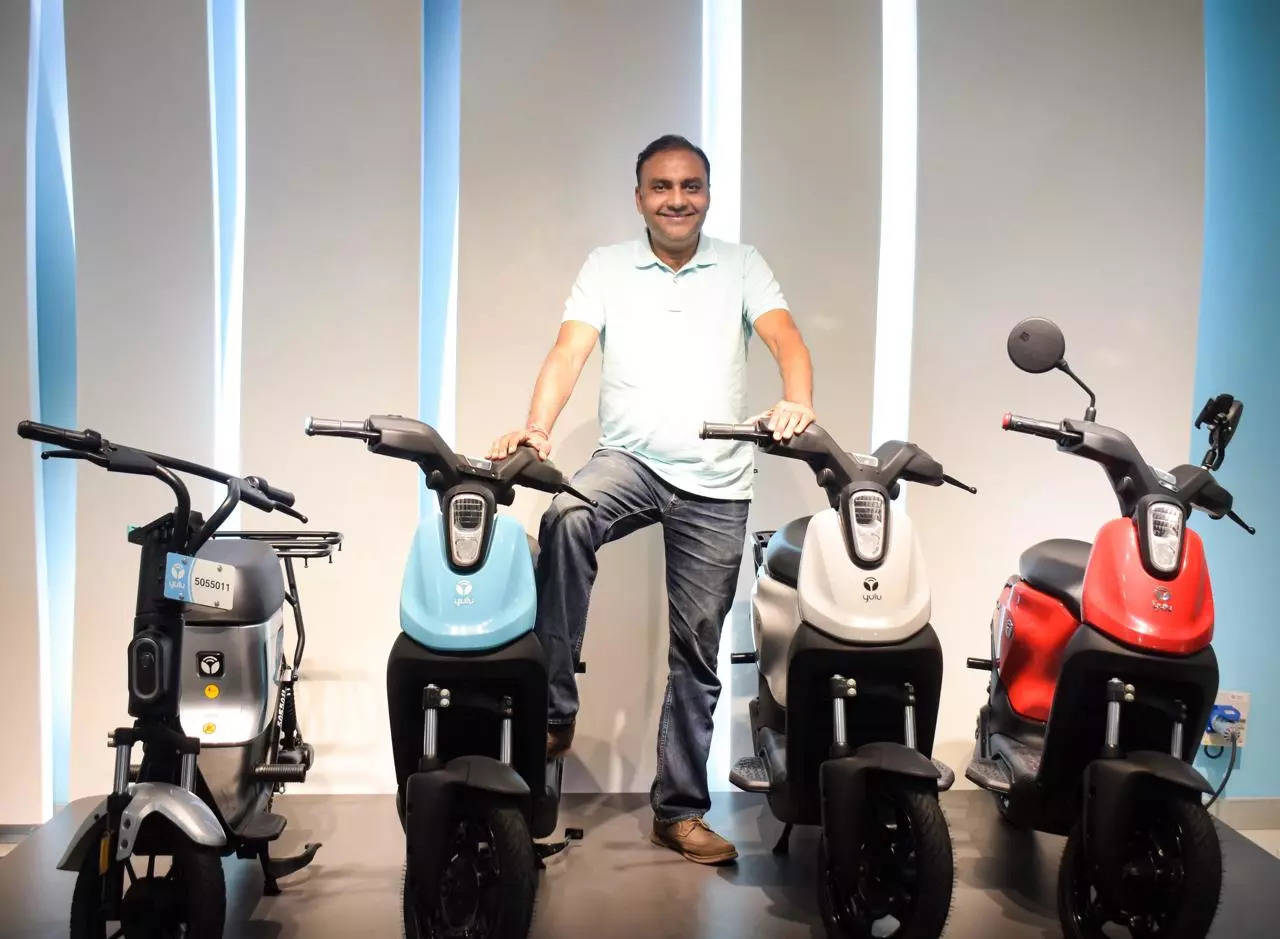
New Delhi: Yulu, the shared mobility startup based in Bengaluru, plans to expand its franchise model beyond Indore where it has announced a partnership with Yuva Mobility.
“Indore is the first stop in this model and we will soon have a top city in Kerala join the list followed by one in Tamil Nadu sometime around May,” Amit Gupta, Co-founder and CEO of Yulu, told ETAuto. This plan is part of the new vision to operate Yulu across the Indian landscape in due course of time.
There are “a bunch of other cities” in the pipeline where “our platform strategy will be able to monetise the opportunities”. According to him, the whole franchise route is “a huge learning” for Yulu which hopes to cover eight cities by the end of this fiscal.
“If things work in this partnership model, we can go beyond India and Yulu will be available in a couple of countries from 2025. We want to be supremely confident of our abilities to be successful with our partners and being able to handhold them in India. This will be a big learning for the overseas foray,” Gupta said.
At present, Yulu operates on its own in Mumbai, Navi Mumbai, Delhi and Gurugram apart from its home turf, Bengaluru. The franchise model is part of its YBP (Yulu Business Partner) initiative which will hopefully help in scaling up business and drawing a whole lot of new riders into its mobility universe.
“We have been getting emails from various regions but our hands are full. On the other hand, a franchise model can work where someone can own the asset and operate it,” explained Gupta. Yulu has a team in place to identify partners with enough financial muscle and passion to make the business successful.
Tamil Nadu beckons
Interestingly, for the city in Tamil Nadu which will join the franchise bandwagon in May, the people concerned came to the Yulu office in Bengaluru by train on a Saturday morning. There was a little back and forth with the security personnel who did not understand Tamil till someone from the Yulu team intervened.
He then discovered that the visitors were there to discuss a business opportunity. The details were discussed and 100 Yulu bikes will now be part of this city’s roads next month. Gupta steered clear of mentioning specific names but it would be fair to assume that the metro lies somewhere in the Madurai-Tirunelveli belt.
As for spreading the Yulu brand to new geographies, this will also follow the same partnership model which has just kicked off in India. “We will not run the show on our own since every global city has its unique DNA which means a partnership approach makes sense…someone who understands the city well matters eventually,” said Gupta.
According to the Yulu CEO, the food delivery business is a global phenomenon where cars are used to ferry orders in the US and Europe. While this is fine for smaller cities which have enough parking spaces for cars, it becomes a different ballgame in crowded metros like New York, Los Angeles or San Francisco where there is really no room for a gig worker’s vehicle.
“For the underprivileged, there is a strong business case to deliver food on e-bikes and not cars which means Yulu has a chance in these cities,’ said Gupta. Right now, the e-bikes operating there are mostly China-made and charged in housing complexes, restaurants etc. However, with the growing number of battery fires, New York City is banning these bikes and carrying out a pilot for swappable batteries.
From New York to Bangkok
“We can perhaps show up in NYC as a viable alternative,” said Gupta. Likewise, Bangkok could be another hunting ground for Yulu since it has the same gig worker ecosystem which is true for other ASEAN regions like Taiwan, Vietnam and the Philippines. As he put it, there is an interesting global opportunity for last mile delivery of goods “in a hyperlocal manner”.
If Yulu is able to crack the challenge of market complexity and price sensitivity in India, it can look at building a “large and lucrative business” elsewhere. “We just need to get some things right and keep our focus intact where the clout of our partners, Bajaj and Magna, will also come in handy. There are huge opportunities but it is important to take one thing at a time. India offers the scope to build mobility opportunities for the world,” said Gupta.
Yulu recently raised USD19.25 million in equity funding from Bajaj Auto and Magna as part of its overall goal of looking at “sizable funding” for its growth. The startup grew 4.5 times in revenue and scale last year with this fiscal expected to maintain the same momentum. “Bajaj and Magna giving money is enough indication that they trust us and the business,” he said.
The overall plan is to raise USD 50million-USD70 million in equity this year and Gupta added that there is a “bipolar situation” in the world right now when it comes to funding with some companies unable to raise money despite giving 50%-70% discount on their last valuation.
Yulu, according to him, “commands respect” and has positively influenced companies with nearly 80% of its business coming from local delivery apps like Swiggy, Zomato and Zepto which contribute substantially to its goods mobility business.
Right now, the Zomato stock is “roaring” and while Swiggy is still private, its market valuation is “also up with internal investors quite bullish”. Zepto raised USD1 billion valuation last year and expected to increase three times as much this year.
Mobility ecosystem
“All this shows that the sector is on a good wicket and Yulu has created a good mobility ecosystem for these companies with good product offerings. We are the only entity to provide gig workers an opportunity to work with these platforms and this gives us a huge push in our growth story,” said Gupta.
Yulu’s mobility-as-a-service products include the Dex, which is its flagship model, and Miracle while Wynn is the ownership model jointly developed with Bajaj Auto. The offering was limited to a few pockets of Bengaluru since the overall objective was to understand the pulse of the market and incorporate all the suggestions.
“The next phase of growth will need patience and marketing dollars to create the buzz,” he said. The efforts with Bajaj Auto largely revolved around value engineering and keeping costs in check. Gupta said there were different levels of energy in the Bajaj boardroom now, borne out by the Chetak’s rising numbers as well as the new CNG motorcycle which is said to be “phenomenal and a brilliant piece of engineering”.
Whether Yulu will include CNG in its business plan is still not known though it is just not wedded to electric mobility alone. “We are energy agnostic as long as it is green,” said Gupta. The company is jointly working with Bajaj Auto on “a few more products” though these are early days yet.
“Yulu in the future can hopefully be sold in Bajaj markets and new products can be developed quickly. Bajaj is a trusted name by the end of the day,” he added. Yulu is also working on a high speed scooter scheduled to debut in Q4 of this fiscal. It will be targeted in the e-commerce space “where we can increase our TAM (total addressable market) dramatically”.

















